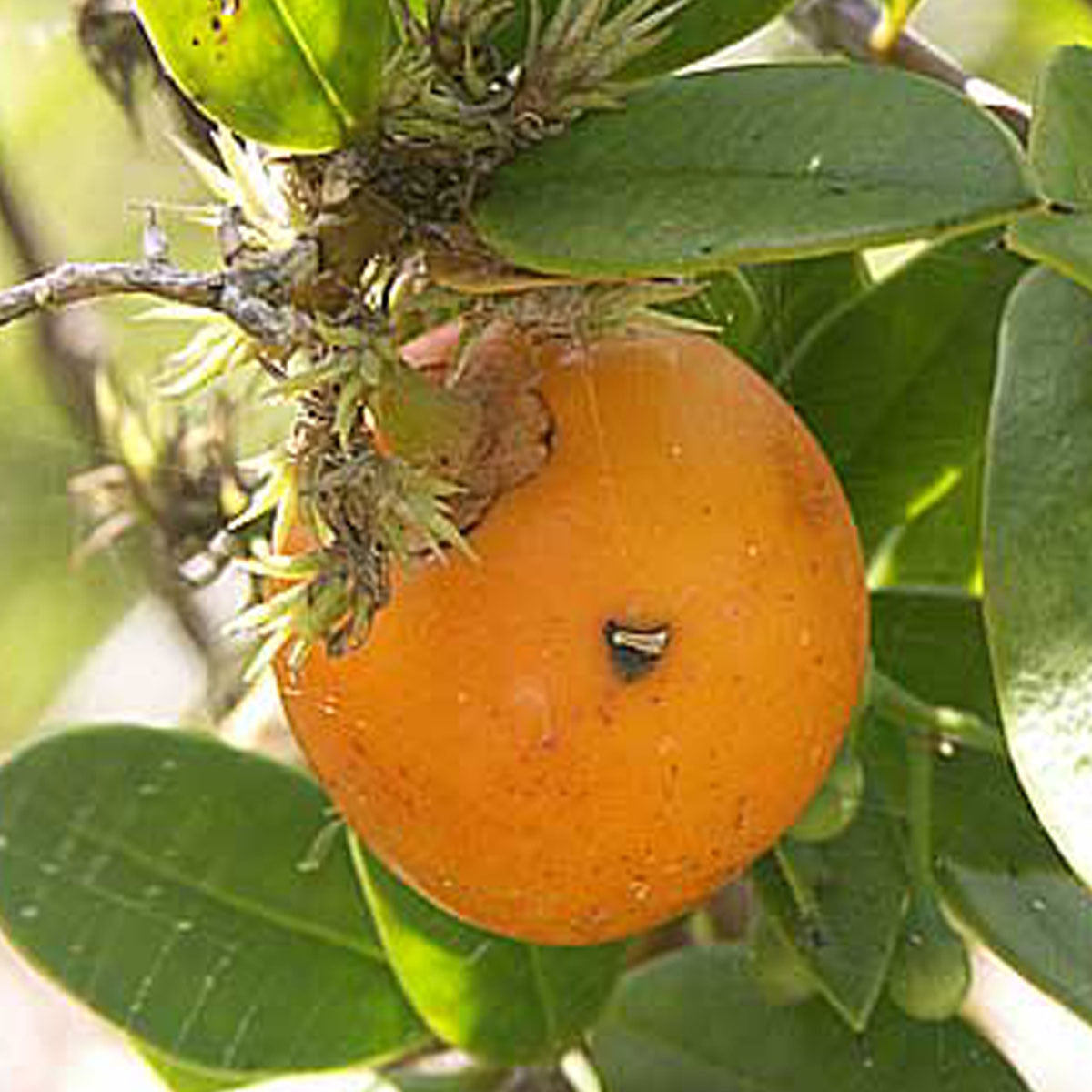Love it? Add to your wishlist
Your favorites, all in one place. Shop quickly and easily with the wishlist feature!
[message]
[title]
[message]



Veliyath Gardens
Couldn't load pickup availability
The Cuban Mangosteen (Garcinia aristata) is one of nature’s little-known tropical wonders — a compact tree from the Garcinia family that bears small, golden-orange fruits bursting with sweet citrus fragrance. Closely related to the famous purple mangosteen, this Cuban treasure carries its own charm, offering a unique combination of taste, nutritional value, and ornamental beauty.
Native to Cuba and neighboring parts of the Caribbean, this fruit plant is now steadily gaining global recognition for its adaptability and exceptional health benefits.
Scientific Name: Garcinia aristata
Common Names: Cuban Mangosteen, Manaju, Palo de Cruz
Plant Family: Clusiaceae (Guttiferae)
Native Range: Cuba, parts of Central America, and tropical regions of the Caribbean
This species thrives naturally in semi-dry tropical climates, particularly along coastal and limestone soils where other fruiting species struggle. Unlike its larger relatives, Garcinia aristata remains a short, bushy tree, rarely exceeding 4 to 6 meters in height, making it ideal for compact gardens and tropical landscapes.
The Cuban Mangosteen is admired for its symmetrical canopy and evergreen foliage, which adds lushness to any fruit garden.
Growth Habit: Small to medium-sized tree with rounded form
Leaves: Thick, glossy green leaves with a leathery texture
Flowers: Small, cream-white blossoms appearing in clusters
Fruits: Round to oval, orange-yellow when ripe, with soft aromatic pulp
The tree begins fruiting within 4 to 5 years under suitable conditions and can produce multiple harvests annually when grown in warm, sunny regions.
Cuban Mangosteen is relatively low-maintenance once established, adapting well to tropical and subtropical conditions.
Prefers high pH sandy loam or limestone soil, common in coastal regions. Good drainage is essential to prevent root rot.
Thrives in full to partial sunlight, requiring at least 6 hours of daily exposure for optimal flowering and fruiting.
Moderate watering is sufficient — the plant prefers consistent moisture without waterlogging. Mulching around the base helps retain soil moisture and suppress weeds.
Classified as moderate maintenance, requiring periodic pruning and fertilization with organic compost or balanced NPK blends for healthy growth and fruit yield.
The fruits of the Cuban Mangosteen are small, rounded, and visually appealing — a bright orange-yellow hue that glows against the glossy green foliage.
Size: 3 to 5 cm in diameter
Flesh: Soft, juicy, and lightly fibrous
Color: Amber to pale orange
Flavor Profile: A pleasant combination of sweetness and mild citrus tang — somewhat reminiscent of Garcinia intermedia and Garcinia livingstonei
Each bite delivers a tropical sweetness balanced by refreshing acidity, making it a delightful fruit to enjoy fresh, as juice, or in desserts.
The Cuban Mangosteen is a nutrient-dense superfruit, blending traditional tropical flavor with a powerful profile of vitamins, minerals, and antioxidants.
Vitamin C – Strengthens immunity and skin vitality
Vitamin B1, B2, and B9 (Thiamine, Riboflavin, Folate) – Supports energy production and cellular health
Manganese & Copper – Contribute to antioxidant defense and bone metabolism
Magnesium – Regulates muscle and nerve function
The fruit is rich in xanthones, rare bioactive compounds found in the Garcinia family known for their strong antioxidant activity. These protect the body’s cells from oxidative stress, slowing down aging and reducing inflammation.
Regular consumption may help lower inflammation markers. Its Vitamin C and xanthone synergy support immune health and protect the body against infections and pollutants.
Early studies and traditional use suggest Garcinia species promote healthy metabolism and weight balance by naturally reducing fat accumulation and regulating appetite.
Xanthone compounds may enhance insulin sensitivity and contribute to maintaining stable blood glucose, beneficial for those monitoring sugar intake.
Antioxidants and Vitamin C protect skin cells from sun damage, aid collagen production, and promote youthful texture, while minerals like copper and manganese strengthen hair roots.
Its fiber-rich pulp aids digestion, while the fruit’s mineral profile supports heart health by reducing bad cholesterol and promoting good lipid balance.
In Cuban and Caribbean folk medicine, Garcinia aristata holds a valued place for its therapeutic uses. The fruit and bark have been used to:
Treat digestive issues and mild fevers
Relieve inflammation and joint discomfort
Promote detoxification through natural antioxidants
Support skin rejuvenation and wound healing
These traditional remedies are now supported by emerging scientific interest in the medicinal potential of xanthone-rich Garcinia species.
The Cuban Mangosteen is not only healthy but also versatile in the kitchen.
Fresh Eating: Enjoyed as a refreshing tropical snack
Juices and Smoothies: Blends beautifully with mango, orange, and pineapple
Desserts: Used in jams, sherbets, or fruit salads
Preserves: Ideal for making syrups, jellies, and marmalades
Its mild citrusy sweetness complements both sweet and savory preparations, making it a chef’s favorite for gourmet tropical recipes.
Beyond its fruiting value, the Cuban Mangosteen serves as an ornamental evergreen with lush green foliage and bright fruits that attract birds and pollinators. It plays an ecological role by enhancing biodiversity in tropical gardens and home orchards.
Gardeners appreciate it for:
Compact growth habit suitable for container gardening
Year-round greenery
Pollinator-friendly flowers
Adaptability to varied tropical soil conditions
The Cuban Mangosteen is becoming a trending fruit plant in exotic nurseries and rare plant collections because it combines elegance, flavor, and function. Gardeners and fruit lovers are drawn to:
Its resemblance to true mangosteen in taste and nutritional profile
Compact size suitable for smaller gardens
Multiple harvest potential
Strong resilience and adaptability
At Veliyath Gardens, this plant stands out as one of the most promising members of the Garcinia family, admired for both health value and tropical beauty.
The Cuban Mangosteen (Garcinia aristata) is a living gem from the tropics — a small but mighty tree that delivers delightful fruit and immense health benefits. With its citrus-sweet taste, golden glow, and antioxidant richness, it’s both a gardener’s pride and a health enthusiast’s delight.
Whether grown in a home garden, tropical orchard, or exotic plant collection, the Cuban Mangosteen embodies the perfect balance of beauty, nutrition, and rarity. Add this extraordinary plant to your garden through Veliyath Gardens and bring home a piece of tropical wellness that will reward you season after season.
Soil
Prefers high pH sandy loam or limestone soil, common in coastal regions. Good drainage is essential to prevent root rot.
Sunlight
Thrives in full to partial sunlight, requiring at least 6 hours of daily exposure for optimal flowering and fruiting.
Watering
Moderate watering is sufficient — the plant prefers consistent moisture without waterlogging. Mulching around the base helps retain soil moisture and suppress weeds.
Supports Weight Management
Early studies and traditional use suggest Garcinia species promote healthy metabolism and weight balance by naturally reducing fat accumulation and regulating appetite.
Regulates Blood Sugar Levels
Xanthone compounds may enhance insulin sensitivity and contribute to maintaining stable blood glucose, beneficial for those monitoring sugar intake.
Its resemblance to true mangosteen in taste and nutritional profile
Compact size suitable for smaller gardens
Multiple harvest potential
Strong resilience and adaptability




